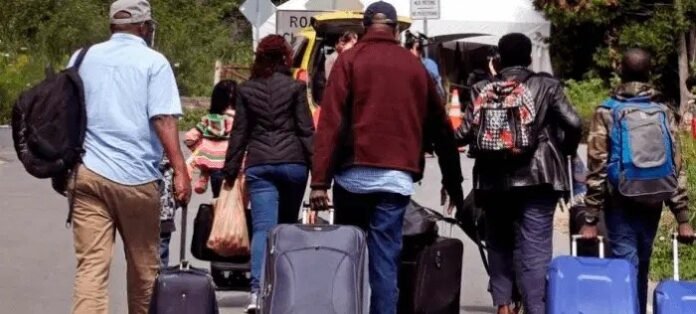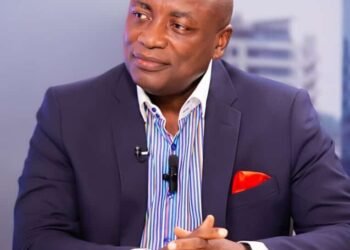Lawyer and political activist Oliver Mawuse Barker-Vormawor has strongly criticized President John Dramani Mahama’s decision to accept U.S. deportees into Ghana, accusing the government of making agreements that undermine transparency and constitutional governance.
Barker-Vormawor, known for his vocal stance on national issues, compared the current situation to a controversial deal made during Mahama’s first term, when the government quietly accepted two former Guantanamo Bay detainees into the country.
“I spoke up against it and called the move tone-deaf. This deal was challenged in the Supreme Court. And the Supreme Court held that the Executive did not have the power to make such deals without Parliamentary oversight and approval.”
Oliver Mawuse Barker-Vormawor
This landmark ruling was hailed as a victory for constitutional accountability and a reminder that no branch of government should act unilaterally on matters with far-reaching implications for national security and sovereignty.
Barker-Vormawor expressed alarm over recent reports suggesting that a new deal has been reached between the Mahama administration and the United States to accept non-Ghanaian deportees from U.S. immigration detention centers.
These individuals, he claimed, are being sent to Ghana to further the political ambitions of former U.S. President Donald Trump, who is seeking to showcase his hardline immigration policies ahead of upcoming elections.
The activist stressed that he is not only concerned about the policy itself but also about whether constitutional requirements were followed.

With the National Democratic Congress (NDC) currently holding a two-thirds majority in Parliament, Barker-Vormawor insisted that any such agreement must be formally submitted to lawmakers for debate and approval before implementation. “Please tell me that at least this time…he submitted this deal to Parliament for approval.”
He further criticized Ghana’s involvement in the deal, cautioning that it could damage the nation’s image by making it appear as though the country is willingly accepting the consequences of divisive U.S. immigration policies.
Mahama Defends Decision On U.S. Deportee Deal
Meanwhile, President Mahama defended the move, revealing that a total of 14 deportees have already arrived in Ghana.
These individuals, he said, include Nigerians and a Gambian national. He explained that Ghana’s responsibility is to temporarily host them while working to facilitate their return to their respective home countries.
“We were approached by the U.S. to accept third-party nationals who were being removed from the U.S., and we agreed with them that West African nationals were acceptable because all our fellow West Africans don’t need a visa to come to our country.”
President John Dramani Mahama
According to the President, Ghana’s decision is guided by its obligations under the Economic Community of West African States (ECOWAS).

As a member of the regional bloc, Ghana is bound by protocols that allow citizens of West African nations to travel freely across borders without requiring visas.
This means that turning away the deportees would have been inconsistent with Ghana’s international commitments and regional cooperation principles.
A Balancing Act Between Regional Duty and National Interest
While Mahama’s explanation highlights Ghana’s legal and diplomatic obligations, Barker-Vormawor argued that the government’s approach remains problematic.
For him, the issue is not solely about compliance with ECOWAS rules but also about ensuring that the nation’s sovereignty and constitutional processes are upheld.
He stressed the importance of transparency, noting that major decisions affecting national security must involve public debate and legislative approval. Failure to do so, he warned, undermines public trust and sets a dangerous precedent for future administrations.
Barker-Vormawor also questioned whether the government has adequately prepared to manage the logistical and security challenges associated with housing deportees, even temporarily.
Without proper systems in place, he fears that the situation could spiral into a humanitarian or security crisis.

The political activist further emphasized that this controversy reflects a deeper issue of governance.
According to him, Ghanaian leaders, whether from the ruling NDC or the opposition NPP, must prioritize the interests of citizens over external political pressures or partisan considerations.
“Just tell me that we at least respected our constitution. Or that the news is wrong,” he concluded, leaving a lingering question about the government’s adherence to constitutional norms.
As the debate intensifies, many Ghanaians are watching closely to see whether Parliament will be consulted on this deal and whether the government can maintain a delicate balance between fulfilling its regional obligations and safeguarding national sovereignty.
The arrival of the deportees has already sparked public concern, with some citizens demanding greater clarity about their identities, the nature of their alleged offenses, and Ghana’s role in their eventual repatriation.
With tensions rising, this issue is poised to become a key talking point in Ghanaian politics, especially as questions of transparency, accountability, and foreign influence take center stage.
READ ALSO: Access Bank Stumbles Slightly After Stunning 214% Year-to-Date Rally



















